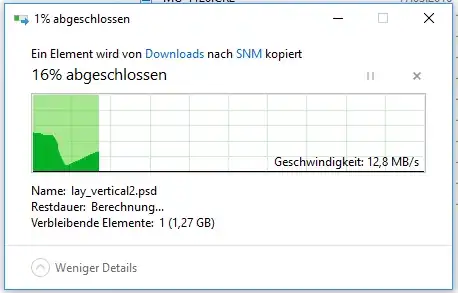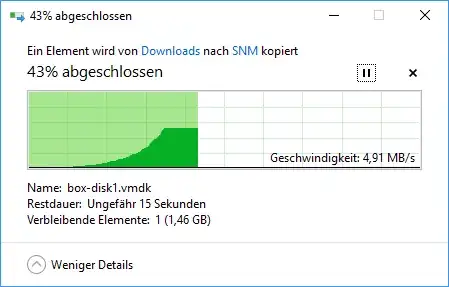We are using the following 1Gbit/s radio link setup: Location A:
- internet gateway with 1Gbits/s sym. fiber
- most of our servers including dhcp, dns, fileservers (smb), voip-server, exchange-server
- 55 clients/users
- directional radio relay A (Lightpointe AireLink 60 SX) - 1Gbits/s
Location B:
- one fileserver (smb)
- 30 clients/users
- directional radio relay B (Lightpointe AireLink 60 SX) - 1Gbits/s
Distance between locations A and B is 177 meters. Both locations are sharing one subnet: 192.168.0.0/24 for clients and servers, VoIP phones are in subnet 10.6.3.0/24 (shared with both locations as well). So there is no routing between both locations and the radio link is working as a bridge.
Settings of the directional radio relay A:
Link Status: UP
Mode: Data
RSSI, dBm: -46
RSSI Alarm Thrshld, dBm: -60
RSSI Alarm Clear, dBm: -50
RF Link: high
TX RF Band, GHz: 62.5
RX RF Band, GHz: 59.5
TX Power, dBm: -7
Distance: Very short
ACM: Enabled
Modulation: 16QAM 5/8
TX Lock: normal lock
RX Lock: normal lock
Modem Lock: locked
Settings of the directional radio relay B:
Link Status: UP
Mode: Data
RSSI, dBm: -49
RSSI Alarm Thrshld, dBm: -60
RSSI Alarm Clear, dBm: -50
RF Link: low
TX RF Band, GHz: 59.5
RX RF Band, GHz: 62.5
TX Power, dBm: -4
Distance: Very short
ACM: Enabled
Modulation: 16QAM 5/8
TX Lock: normal lock
RX Lock: normal lock
Modem Lock: locked
RF Link RX Error directional radio relay A: 0 RF Link RX Error directional radio relay B: 0
We are experiencing the following problems at location B:
- VoIP audio interrupts (mostly only one direction a time for about 3 seconds each)
- smb throughput sometimes drops to 5 Mbit/s or even lower
- outgoing mail (exchange server) is very slow sometimes
- slow Internet connection
File transfer rate drops to zero and file transfer aborts with 0x8007003B (location A->B):


to sum it up: it seems as there is something causing a massive throughput drop, but we don't know what is happening here. We installed two "man-in-the-middle" servers with two bridged Ethernet ports each to collect some data with ntopng and tshark at both locations between the radio link data port and the switch port connecting it to the local network.
There are no problems accessing servers of location A from client of location A and accessing servers of location B from clients of location B.
- server.location-a = 192.168.0.149
- server.location-b = 192.168.0.242
iperf is showing good data rates:
user@location-a:~$ iperf -c server.location-b -i 2 -t 20
------------------------------------------------------------
Client connecting to server.location-b, TCP port 5001
TCP window size: 512 KByte (default)
------------------------------------------------------------
[ 3] local 192.168.0.149 port 63378 connected with 192.168.0.242 port 5001
[ ID] Interval Transfer Bandwidth
[ 3] 0.0- 2.0 sec 198 MBytes 832 Mbits/sec
[ 3] 2.0- 4.0 sec 195 MBytes 817 Mbits/sec
[ 3] 4.0- 6.0 sec 198 MBytes 831 Mbits/sec
[ 3] 6.0- 8.0 sec 199 MBytes 836 Mbits/sec
[ 3] 8.0-10.0 sec 165 MBytes 692 Mbits/sec
[ 3] 10.0-12.0 sec 198 MBytes 829 Mbits/sec
[ 3] 12.0-14.0 sec 195 MBytes 817 Mbits/sec
[ 3] 14.0-16.0 sec 193 MBytes 810 Mbits/sec
[ 3] 16.0-18.0 sec 200 MBytes 838 Mbits/sec
[ 3] 18.0-20.0 sec 199 MBytes 833 Mbits/sec
[ 3] 0.0-20.0 sec 1.89 GBytes 814 Mbits/sec
both directions with --tradeoff (-r)
user@location-a:~$ iperf -c server.location-b -i 2 -t 20 -r
------------------------------------------------------------
Server listening on TCP port 5001
TCP window size: 1.00 MByte (default)
------------------------------------------------------------
------------------------------------------------------------
Client connecting to server.location-b, TCP port 5001
TCP window size: 512 KByte (default)
------------------------------------------------------------
[ 4] local 192.168.0.149 port 49535 connected with 192.168.0.242 port 5001
[ ID] Interval Transfer Bandwidth
[ 4] 0.0- 2.0 sec 191 MBytes 801 Mbits/sec
[ 4] 2.0- 4.0 sec 196 MBytes 824 Mbits/sec
[ 4] 4.0- 6.0 sec 196 MBytes 822 Mbits/sec
[ 4] 6.0- 8.0 sec 193 MBytes 809 Mbits/sec
[ 4] 8.0-10.0 sec 196 MBytes 821 Mbits/sec
[ 4] 10.0-12.0 sec 187 MBytes 783 Mbits/sec
[ 4] 12.0-14.0 sec 164 MBytes 690 Mbits/sec
[ 4] 14.0-16.0 sec 166 MBytes 697 Mbits/sec
[ 4] 16.0-18.0 sec 191 MBytes 803 Mbits/sec
[ 4] 18.0-20.0 sec 196 MBytes 820 Mbits/sec
[ 4] 0.0-20.0 sec 1.83 GBytes 787 Mbits/sec
[ 4] local 192.168.0.149 port 5001 connected with 192.168.0.242 port 45775
[ 4] 0.0- 2.0 sec 221 MBytes 928 Mbits/sec
[ 4] 2.0- 4.0 sec 221 MBytes 929 Mbits/sec
[ 4] 4.0- 6.0 sec 222 MBytes 933 Mbits/sec
[ 4] 6.0- 8.0 sec 222 MBytes 933 Mbits/sec
[ 4] 8.0-10.0 sec 222 MBytes 932 Mbits/sec
[ 4] 10.0-12.0 sec 188 MBytes 789 Mbits/sec
[ 4] 12.0-14.0 sec 223 MBytes 935 Mbits/sec
[ 4] 14.0-16.0 sec 222 MBytes 932 Mbits/sec
[ 4] 16.0-18.0 sec 223 MBytes 934 Mbits/sec
[ 4] 18.0-20.0 sec 222 MBytes 933 Mbits/sec
[ 4] 0.0-20.0 sec 2.14 GBytes 918 Mbits/sec
reversing iperf server and client:
user@location-b:~# iperf -c server.location-a -i 2 -t 20
------------------------------------------------------------
Client connecting to server.location-a, TCP port 5001
TCP window size: 85.0 KByte (default)
------------------------------------------------------------
[ 3] local 192.168.0.242 port 45778 connected with 192.168.0.149 port 5001
[ ID] Interval Transfer Bandwidth
[ 3] 0.0- 2.0 sec 220 MBytes 921 Mbits/sec
[ 3] 2.0- 4.0 sec 218 MBytes 916 Mbits/sec
[ 3] 4.0- 6.0 sec 217 MBytes 910 Mbits/sec
[ 3] 6.0- 8.0 sec 221 MBytes 926 Mbits/sec
[ 3] 8.0-10.0 sec 213 MBytes 892 Mbits/sec
[ 3] 10.0-12.0 sec 188 MBytes 787 Mbits/sec
[ 3] 12.0-14.0 sec 218 MBytes 916 Mbits/sec
[ 3] 14.0-16.0 sec 218 MBytes 916 Mbits/sec
[ 3] 16.0-18.0 sec 219 MBytes 919 Mbits/sec
[ 3] 18.0-20.0 sec 223 MBytes 937 Mbits/sec
[ 3] 0.0-20.0 sec 2.10 GBytes 904 Mbits/sec
dualtest with -d:
user@location-b:~# iperf -c server.location-a -i 2 -t 10 -d
------------------------------------------------------------
Server listening on TCP port 5001
TCP window size: 85.3 KByte (default)
------------------------------------------------------------
------------------------------------------------------------
Client connecting to server.location-a, TCP port 5001
TCP window size: 255 KByte (default)
------------------------------------------------------------
[ 5] local 192.168.0.242 port 45784 connected with 192.168.0.149 port 5001
[ 4] local 192.168.0.242 port 5001 connected with 192.168.0.149 port 52423
[ ID] Interval Transfer Bandwidth
[ 5] 0.0- 2.0 sec 210 MBytes 882 Mbits/sec
[ 4] 0.0- 2.0 sec 45.7 MBytes 192 Mbits/sec
[ 5] 2.0- 4.0 sec 172 MBytes 722 Mbits/sec
[ 4] 2.0- 4.0 sec 50.8 MBytes 213 Mbits/sec
[ 5] 4.0- 6.0 sec 205 MBytes 859 Mbits/sec
[ 4] 4.0- 6.0 sec 65.5 MBytes 275 Mbits/sec
[ 5] 6.0- 8.0 sec 215 MBytes 901 Mbits/sec
[ 4] 6.0- 8.0 sec 73.0 MBytes 306 Mbits/sec
[ 5] 8.0-10.0 sec 223 MBytes 934 Mbits/sec
[ 5] 0.0-10.0 sec 1.00 GBytes 860 Mbits/sec
[ 4] 8.0-10.0 sec 55.0 MBytes 231 Mbits/sec
[ 4] 0.0-10.0 sec 290 MBytes 243 Mbits/sec
iperf both directions while starting a smb file transfer location A -> B (there is no problem starting a smb filetransfer from location B -> A:
user@location-b:~# iperf -c server.location-a -i 1 -t 30 -r
------------------------------------------------------------
Server listening on TCP port 5001
TCP window size: 85.3 KByte (default)
------------------------------------------------------------
------------------------------------------------------------
Client connecting to server.location-a, TCP port 5001
TCP window size: 238 KByte (default)
------------------------------------------------------------
[ 5] local 192.168.0.242 port 45787 connected with 192.168.0.149 port 5001
[ ID] Interval Transfer Bandwidth
[ 5] 0.0- 1.0 sec 111 MBytes 934 Mbits/sec
[ 5] 1.0- 2.0 sec 109 MBytes 913 Mbits/sec
[ 5] 2.0- 3.0 sec 111 MBytes 928 Mbits/sec
[ 5] 3.0- 4.0 sec 111 MBytes 932 Mbits/sec
[ 5] 4.0- 5.0 sec 111 MBytes 928 Mbits/sec
[ 5] 5.0- 6.0 sec 101 MBytes 844 Mbits/sec
[ 5] 6.0- 7.0 sec 73.8 MBytes 619 Mbits/sec
[ 5] 7.0- 8.0 sec 111 MBytes 929 Mbits/sec
[ 5] 8.0- 9.0 sec 109 MBytes 916 Mbits/sec
[ 5] 9.0-10.0 sec 112 MBytes 938 Mbits/sec
[ 5] 10.0-11.0 sec 109 MBytes 918 Mbits/sec
[ 5] 11.0-12.0 sec 111 MBytes 933 Mbits/sec
[ 5] 12.0-13.0 sec 106 MBytes 891 Mbits/sec
[ 5] 13.0-14.0 sec 85.8 MBytes 719 Mbits/sec
[ 5] 14.0-15.0 sec 112 MBytes 935 Mbits/sec
[ 5] 15.0-16.0 sec 111 MBytes 934 Mbits/sec
[ 5] 16.0-17.0 sec 110 MBytes 924 Mbits/sec
[ 5] 17.0-18.0 sec 112 MBytes 937 Mbits/sec
[ 5] 18.0-19.0 sec 112 MBytes 940 Mbits/sec
[ 5] 19.0-20.0 sec 112 MBytes 935 Mbits/sec
[ 5] 20.0-21.0 sec 111 MBytes 928 Mbits/sec
[ 5] 21.0-22.0 sec 110 MBytes 923 Mbits/sec
[ 5] 22.0-23.0 sec 79.1 MBytes 664 Mbits/sec
[ 5] 23.0-24.0 sec 112 MBytes 937 Mbits/sec
[ 5] 24.0-25.0 sec 112 MBytes 936 Mbits/sec
[ 5] 25.0-26.0 sec 111 MBytes 934 Mbits/sec
[ 5] 26.0-27.0 sec 112 MBytes 937 Mbits/sec
[ 5] 27.0-28.0 sec 111 MBytes 928 Mbits/sec
[ 5] 28.0-29.0 sec 112 MBytes 938 Mbits/sec
[ 5] 29.0-30.0 sec 112 MBytes 941 Mbits/sec
[ 5] 0.0-30.0 sec 3.15 GBytes 901 Mbits/sec
[ 4] local 192.168.0.242 port 5001 connected with 192.168.0.149 port 52898
[ 4] 0.0- 1.0 sec 104 MBytes 872 Mbits/sec
[ 4] 1.0- 2.0 sec 103 MBytes 867 Mbits/sec
[ 4] 2.0- 3.0 sec 97.9 MBytes 822 Mbits/sec
[ 4] 3.0- 4.0 sec 95.9 MBytes 804 Mbits/sec
[ 4] 4.0- 5.0 sec 101 MBytes 851 Mbits/sec
[ 4] 5.0- 6.0 sec 102 MBytes 860 Mbits/sec
[ 4] 6.0- 7.0 sec 103 MBytes 867 Mbits/sec
[ 4] 7.0- 8.0 sec 103 MBytes 868 Mbits/sec
[ 4] 8.0- 9.0 sec 50.0 MBytes 419 Mbits/sec
[ 4] 9.0-10.0 sec 14.8 MBytes 124 Mbits/sec
[ 4] 10.0-11.0 sec 0.00 Bytes 0.00 bits/sec
[ 4] 11.0-12.0 sec 0.00 Bytes 0.00 bits/sec
[ 4] 12.0-13.0 sec 0.00 Bytes 0.00 bits/sec
[ 4] 13.0-14.0 sec 0.00 Bytes 0.00 bits/sec
[ 4] 14.0-15.0 sec 0.00 Bytes 0.00 bits/sec
[ 4] 15.0-16.0 sec 0.00 Bytes 0.00 bits/sec
[ 4] 16.0-17.0 sec 0.00 Bytes 0.00 bits/sec
[ 4] 17.0-18.0 sec 0.00 Bytes 0.00 bits/sec
[ 4] 18.0-19.0 sec 0.00 Bytes 0.00 bits/sec
[ 4] 19.0-20.0 sec 0.00 Bytes 0.00 bits/sec
[ 4] 20.0-21.0 sec 0.00 Bytes 0.00 bits/sec
[ 4] 21.0-22.0 sec 0.00 Bytes 0.00 bits/sec
[ 4] 22.0-23.0 sec 0.00 Bytes 0.00 bits/sec
[ 4] 23.0-24.0 sec 0.00 Bytes 0.00 bits/sec
[ 4] 24.0-25.0 sec 0.00 Bytes 0.00 bits/sec
[ 4] 25.0-26.0 sec 0.00 Bytes 0.00 bits/sec
[ 4] 26.0-27.0 sec 0.00 Bytes 0.00 bits/sec
[ 4] 27.0-28.0 sec 0.00 Bytes 0.00 bits/sec
[ 4] 0.0-28.9 sec 876 MBytes 255 Mbits/sec